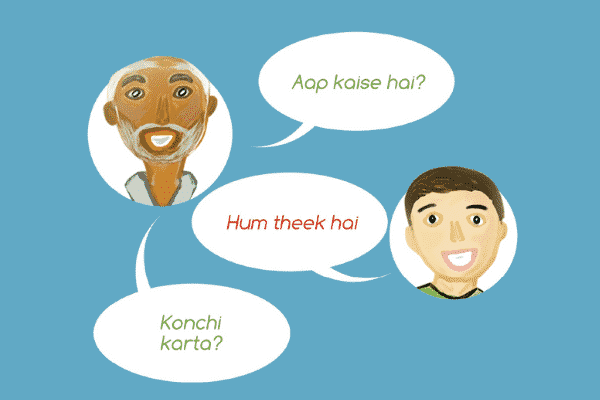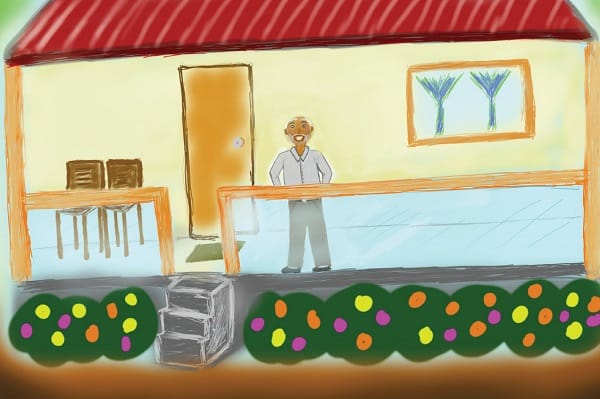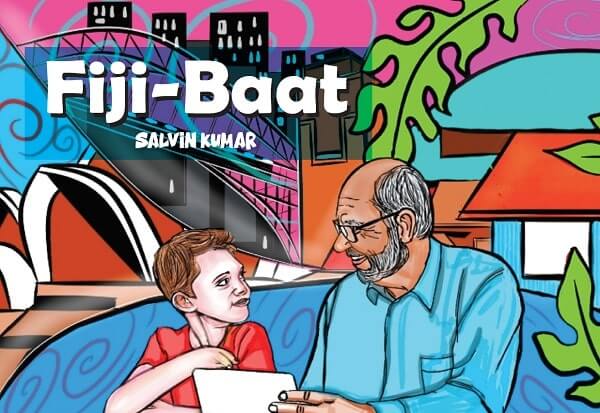Before we got to Fiji, I had never really talked to Nana. Mum would sometimes give me the phone to say hello. I would say hi and quickly run to my room. I could only speak English, and I could not speak my Nana’s language.
Fiji-Baat is a children’s series about a 9-year-old Aussie boy spending time with his Fijian Nana (maternal grandfather). In book one the young boy flies to Fiji for Christmas and meets his Nana for the first time; in book two, Nana comes to Sydney.
The title translates to ‘Fiji talk’, a language spoken by Indo-Fijians which is mostly Hindi mixed with Bhojpuri and South Indian languages like Tamil, Telugu and Malayalam.
“The language is the product of influences from other languages that have existed since the Girmit period (when Indians were brought to Fiji by British settlers to work in plantations),” author Salvin Kumar told Indian Link, a descendant of the Tamil Girmitiyas himself.

Kumar – a Sydney-based teacher and social worker of Indo-Fijian background – wrote, illustrated and self-published the book. He was motivated by the ongoing identity conflict he observed among his community’s younger generation.
“Our children were feeling like they weren’t Indo-Fijian enough because they couldn’t speak Fiji-Baat. It was then that I decided to write Fiji-Baat the book,” Salvin revealed.
At the spice shops in Sydney, mum would sometimes bump into other women she knew from Fiji.
They would smile and talk. Sometimes they would ask me, “You know Fiji-Baat?”
Mum would look at me and ask, “Can you say Namaskaram to Aunty?”.
“Na-Ma-Sss-Ka-Ram, Aunty,” I would say.

The two-part series encapsulates the experience of a second-generation Australian kid (of Fijian or any minority background) interacting with relatives who are either very well connected to the country their parents migrated from or who still live there.
The shyness, newness, and curiosity are all too relatable.
The boy assumes that his Nana does not speak English, but in Fiji, he finds out he does! The two teach and learn new things from each other, and their little exchanges in Fiji baat are fun and informative.
When Nana comes to Sydney, he accompanies his grandson to Taronga Zoo where the nine-year-old learns the words for different animals in Fiji baat.

“Illustrations such as the image of driving home from the airport, seeing his Nana waiting for their car to arrive are all inspired by my upbringing. These images have shaped a huge part of my cultural and identity connection,” Salvin reminisced. “I knew this to be love as a child. The sense of belonging to a country and grandparents showering us with love. They would wait for us to arrive and would have sweets and all kinds of food ready for us to eat.”
Fiji-Baat is about connecting with grandparents, language, identity and all the sweet moments that accompany a diasporic homecoming.
The series is special because it highlights the experience of migrant communities, a step away from stories of mainstream experiences or personified animals learning morals. Simultaneously, the Fiji-Baat series also widens the label of stories that are considered ‘typically’ Australian.
It can be puzzling and lonely for ethnic kids from diverse backgrounds to feel confident in their identity, but it doesn’t have to be a challenge, especially when there are stories like Fiji-Baat to help them through it.
“I hope that parents of migrant backgrounds who feel that they aren’t able to give enough cultural knowledge to their children are able to have conversations with them while reading the book,” Salvin expressed. “I also hope that children who are born in countries where migrants live will learn to understand that their identities valid even if they don’t speak their mother tongue, and that they can include cultural learning and language in the books that they read.”
READ ALSO: The Big Book of Festivals: a children’s guide to global cultures
Link up with us!
Indian Link News website: Save our website as a bookmark
Indian Link E-Newsletter: Subscribe to our weekly e-newsletter
Indian Link Newspaper: Click here to read our e-paper
Indian Link app: Download our app from Apple’s App Store or Google Play and subscribe to the alerts
Facebook: facebook.com/IndianLinkAustralia/
Twitter: @indian_link
Instagram: @indianlink
LinkedIn: linkedin.com/IndianLinkMediaGroup





